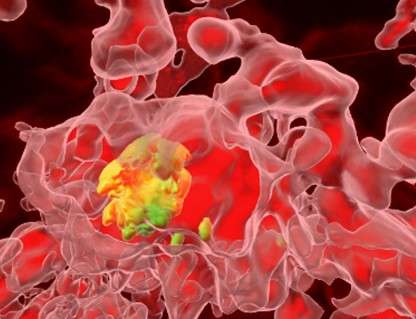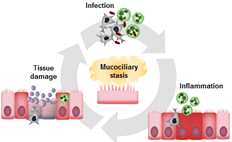Research projects – Team 7
GROUP 1: MECHANISMS OF BACTERIAL INTRAMACROPHAGE SURVIVAL AND ANTI-VIRULENCE STRATEGIES
Group leader : Dr. Anne BLANC-POTARD
Our goal is to better understand the intramacrophage phase encountered by the extracellular bacterial pathogen Pseudomonas aeruginosa, particularly in the context of cystic fibrosis (CF). We have identified various bacterial factors involved in this step, which constitute therapeutic targets for new anti-infective molecules.

We develop the zebrafish embryo model to define the involvement of this intramacrophage phase in the establishment and persistence of the infection, in a normal or CF context. We are also using this vertebrate model to test new strategies to limit P. aeruginosa infection.
GROUP 2: ANTIBACTERIAL DEFENSES AND INFLAMMATION DURING CYSTIC FIBROSIS
Group leader : Dr. Audrey BERNUT
Cystic fibrosis is one of the most frequent fatal genetic diseases in the world. In patients with cystic fibrosis, mutations in the cftr gene trigger the accumulation of thick mucus in the respiratory airways. This promotes recurrent colonization by different pathogenic bacteria as well as an exaggerated immune response, which together conspire to cause fatal lung damage. In addition, mutations in cftr may impact the patients’ immune responses, making these responses more harmful to the host and less effective in fighting bacterial pathogens. However, the mechanisms by which CFTR acts on these processes are poorly understood.

In order to increase our understanding of this altered immune response in cystic fibrosis, we developed an approach based on the use of CFTR-deficient zebrafish models. Thanks to its transparency, the zebrafish larva is an unparalleled in vivo system for visualizing and studying the direct effects of a dysfunctional CFTR on cell-scale anti-infective and inflammatory responses and it allows us to look at some aspects of the lung pathology associated with the disease.
Thanks to the use of zebrafish larvae, our work aims to:
1. assess how CFTR regulates innate immune responses and how its imbalance may promote infection and inflammation in CF,
2. identify therapeutic compounds likely to restore immune balance and infection control.